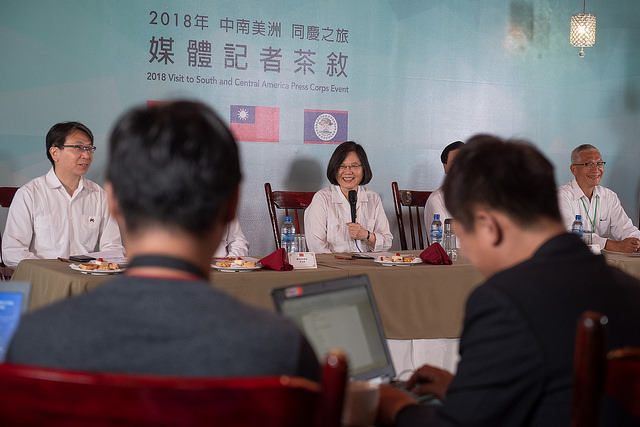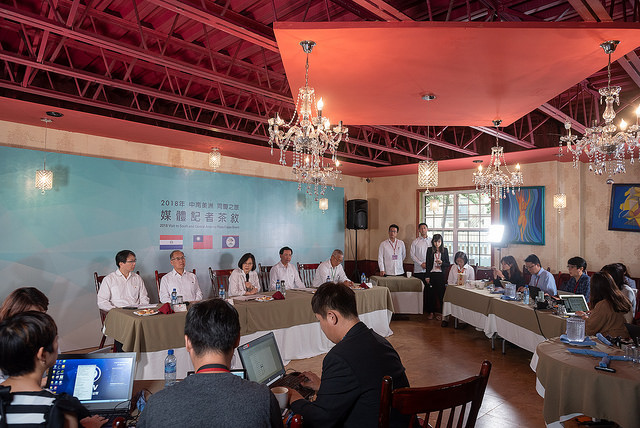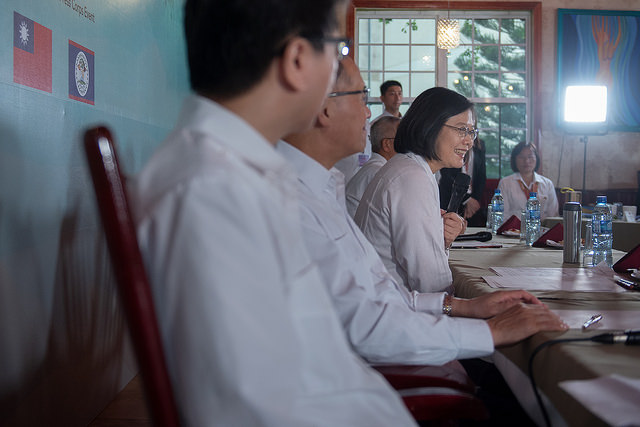News & activities
 News releases
News releases
President Tsai Ing-wen held a reception in Belize for the press corps traveling with her delegation on state visits to Paraguay and Belize on the afternoon of Friday, August 17 local time (morning of August 18 Taipei time). At the gathering, she explained the trip's achievements and responded to questions from reporters.
In remarks, President Tsai noted that her trip to Paraguay and Belize was nearing its end, and that around noon the next day she would depart Belize bound for Houston, Texas. During about a week of travel, she said, her delegation went many places and had a very full agenda. The press was briefed in a timely manner at every step of the way, and the president took this opportunity to give a brief summary of the trip.
President Tsai pointed out that the most important event on the trip was attending the inauguration of Paraguayan President Mario Abdo Benítez, where she had opportunities to interact with heads and deputy heads of state, and delegation heads representing many nations. She also took part in a number of bilateral discussions to further mutual understanding, some regarding the direction of future cooperation, and some to gain a better mutual understanding of the domestic dynamics in each other's countries.
A second important aspect of the trip, said the president, was having a chance to give people working at Taiwan's overseas technical missions some good news: The Ministry of Foreign Affairs has decided to increase their rent allowances and their children's education stipends. After her last trip to eSwatini (formerly known as Swaziland) earlier this year, she said, she understood more about the daily lives and challenges of Taiwan personnel at overseas technical missions, and wanted to adjust their compensation. Thanks to changes adopted four months after that trip, the hard-working staff at our technical missions, said the president, can now receive the same stipends enjoyed by diplomatic personnel.
A third important component of the trip, said the president, was that many items on the agenda concerned education. One such item was the Taiwan Scholarship Program, and she hopes that young people from our diplomatic allies can study in Taiwan, so the government has continued to increase the number of scholarships available. A second item was technical and vocational education, including a Taiwan-Paraguay Polytechnic University (Universidad Politécnica Taiwán-Paraguay, UPTP). Although an agreement was reached quickly when the plan for the university was initially discussed based on its clear merits, while implementing that plan, both sides invested a lot of time and energy discussing the details and working out the division of labor. What the delegation saw a few days before were the results of that planning stage, and both countries will keep working to make the UPTP better and more comprehensive to cultivate a new generation of talent to support Paraguay's industrial development.
Commenting on issuing certificates to Taiwan Scholarships recipients from Belize, President Tsai stated that having students from Belize study with Taiwan university students is not only meaningful for the Belizeans, but is also very stimulating for their Taiwanese classmates. We welcome those students to enroll in technical and vocational education programs in Taiwan, she said. In addition to formal education, Taiwan also provides young students from diplomatic allies with access to an expanded range of technical and vocational programs so that they can come to Taiwan for direct training.
President Tsai compared cooperative programs between Taiwan and its diplomatic allies to making clothing, saying that our cooperation isn't like a mass production factory producing standard items, but more like a highly skilled master tailor turning out made-to-order garments. That, she added, is the spirit of "mutual assistance for mutual benefits."
President Tsai also thanked the traveling press corps, noting that their reporting was featured prominently in Taiwanese media, and led the Taiwan public learn about every aspect of the government's diplomatic work.
Commenting on the recent incident involving the 85°C café, President Tsai stated that the shop just happened to be near her hotel. Taiwanese coffee shops can operate in the United States, and achieving that kind of scale and success is certainly commendable. For people living and working far from home, having a place like 85°C café that eases their homesickness is valuable. It's quite regrettable that buying one cup of coffee triggered so much political pressure, which made the coffee lose some of its flavor, she said. When a Taiwanese firm is forced to make a political declaration, it puts them in a dilemma. Developments like that aren't healthy, she said, and unhelpful to cross-strait relations.
President Tsai said that after living through periods of colonial rule and authoritarian rule, Taiwanese are most proud of the democracy and freedom that have gradually taken root in our country. That historical process shows that Taiwanese are resilient. And because they have that kind of resilience, she said, the people of Taiwan will not bow to that kind of pressure. While the 85°C café incident is regrettable, we cannot react by pointing fingers of blame. What we need to do is unite to uphold Taiwan's democracy and freedom. That's the approach we should take.
After completing her remarks, President Tsai responded to reporters' questions about the 85°C café incident, Taiwan's minimum wage, and other topics. She stated that we cannot allow China's suppression to create internal divisions and recrimination in Taiwan. That's the worst possible result. When faced with suppression, we need to be more united and uphold our commitment to democracy and freedom. But the root of the problem is mainland China. At this stage, China hopes to become a respected major power, and a positive force that plays a leading role in regional development. But if that's what China wants, it will have to build trust by creating more positive interactions within the region and across the Taiwan Strait. This kind of suppression and pettiness is not what you would expect from a responsible nation within the region.
President Tsai further stated that the suppression we are now seeing may just be a standard reaction from a bureaucratic system, or a means to resolve internal problems. She called on China to view things from the elevated perspective of a leader, and said she sincerely hopes China will eventually become a major power that deserves respect, and a positive force in the region. She believes that China's leaders aspire to do that, and if so, then their current suppression tactics run counter to the regional role they want to play. "I believe their leadership understands that, and shares that point of view," she said.
This is not the first time mainland China has done these things, and it won't be the last, said the president. But if they don't correctly understand the effects of what they do, or how others view their behavior, then the president thinks this won't be the last time, and we will see these problems manifest in other forms.
What's most important, said President Tsai, is how we ourselves view the problem. When a Taiwanese company is suppressed, we must support and encourage that company, and we hope that what they do under momentary pressure will not become a permanent state of affairs. Even more, we hope that company will be a more committed supporter of Taiwan's democracy and freedom.
In response to a reporter's question about the minimum wage increase, President Tsai pointed out that when labor and management engage in wage negotiations, the result never pleases everyone. Neither of the two sides will be satisfied, but they do accept it, even if reluctantly. This time has certainly been no exception. The minimum wage was raised mainly because the economy is improving and growing. So we felt that labor should share in the overall economic gains so that Taiwan can gradually overcome the wage stagnation problem. This is the government's unchanging approach.
Raising the minimum wage is a primary tool in the Executive Yuan's initiative to resolve wage stagnation, but before raising the minimum wage we have to consider the overall economy and corporate competitiveness. The National Development Council and the Central Bank have both assessed the situation, and concluded that a wage increase of this size was appropriate. In other words, taking into account the overall economy and corporate competitiveness, a minimum wage increase was doable and would enable labor to share in the fruits of economic development. So this wage increase should improve the wage stagnation problem without affecting Taiwan's international competitiveness. With the economy growing, we have the ample flexibility to do this, she said.
President Tsai also stated that we have to take the problem of low wages for young people seriously, and the minimum wage increase will lessen the problem to some degree. But that's not the only way to address low wages. During the course of tax reform, she said, we introduced tax reductions and exemptions for middle and low income citizens. In addition, the Executive Yuan has announced a program to provide young parents with more childcare assistance in terms of both services and financial assistance. On another front, we have also accelerated our effort to make more social housing available and provide young people with affordable, safe, and comfortable housing in urban areas. These are all things we're doing to reduce the problem of low youth wages. The minimum wage is just one part of the picture. This minimum wage increase raises not just monthly minimum wage, but also the minimum hourly wage, because many young people work part-time jobs. The government also wants an appropriate raise in the pay of part-time workers.
National Security Council Secretary-General David T. Lee (李大維), National Security Council Deputy Secretary-General Tsai Ming-yen (蔡明彥), Minister of Foreign Affairs Joseph Wu (吳釗燮), and ROC Ambassador to Belize Charles K.Y. Liu (劉克裕) were also in attendance.












